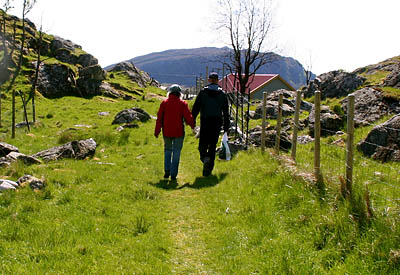Keeping Pace with the Earth
Anna Skarstad ’11 wants to be a farmer, but she’s not willing to hoe that row until she understands why
By H. Jay Burns
Last summer, Anna Skarstad ’11 lived amidst Norwegian farmers, hoping to learn a little about their lives and more about her own.
Skarstad, you see, wants to be a farmer, but she’s not willing to hoe that row until she understands why. A quote from Thoreau’s Walden is one of her favorites: “As long as possible live free and uncommitted. It makes but little difference whether you are committed to a farm or the county jail.”

Skarstad worked for Norwegian sheep farmers Anders Braanaas and Hilde Buer, seen here walking hand in hand on an island adjacent to Grøneng Island, where Buer has her farm.
Skarstad, of Pleasantville, N.Y., wasn’t raised to farm. Her father is a noted violinmaker, and her mother is a composer who also handles press coverage for the Tokyo Quartet. In fact, there’s a break with farming in the family tree: To immigrate to the U.S., her father’s Norwegian grandparents left a family farm.
But farming apparently didn’t leave the Skarstad genome. When she was 10, Skarstad saw a documentary about Norwegian farming. She saw men, tethered by ropes, descending a Norwegian hillside to harvest hay. “I couldn’t believe that was a reality,” she says.
| She won an Otis Fellowship, a Bates grant program designed to help students explore their relationship with nature. “I wanted to go to Norway to see how the farmers survive,” she says. |
Last spring, she won an Otis Fellowship, a Bates grant program designed to help students explore their relationship with nature.
“I wanted to go to Norway to see how the farmers survive,” she says. “I knew that farming was much harder than I thought. It’s deeper, too — it’s a life.”
She found hosts in Norway through World Wide Opportunities on Organic Farms: Anders Braanaas, whose inland farm was in Førde, and Hilde Buer, whose coastal farm was on Grøneng Island. Each had been widowed several years ago, and, to skip a lot of details, “the two sheep farmers fell in love,” explains Skarstad.
She recalls a moment: the couple working together in a sheep pen filled with noise, manure, and confusion. “But Anders and Hilde were happy and laughing together. That’s where their relationship was: with the earth, nature, and especially their animals.”
Skarstad helped both farmers, often driving a banged-up Czech car between the two farms. At first, it all felt helter-skelter: painting a barn here, putting up a fence there. “All the tasks seemed unrelated, like pods of work,” she says. Slowly, she saw unity in all the farm duties. “It all had so much of a point,” she says now. “We were working to keep pace with the earth.”